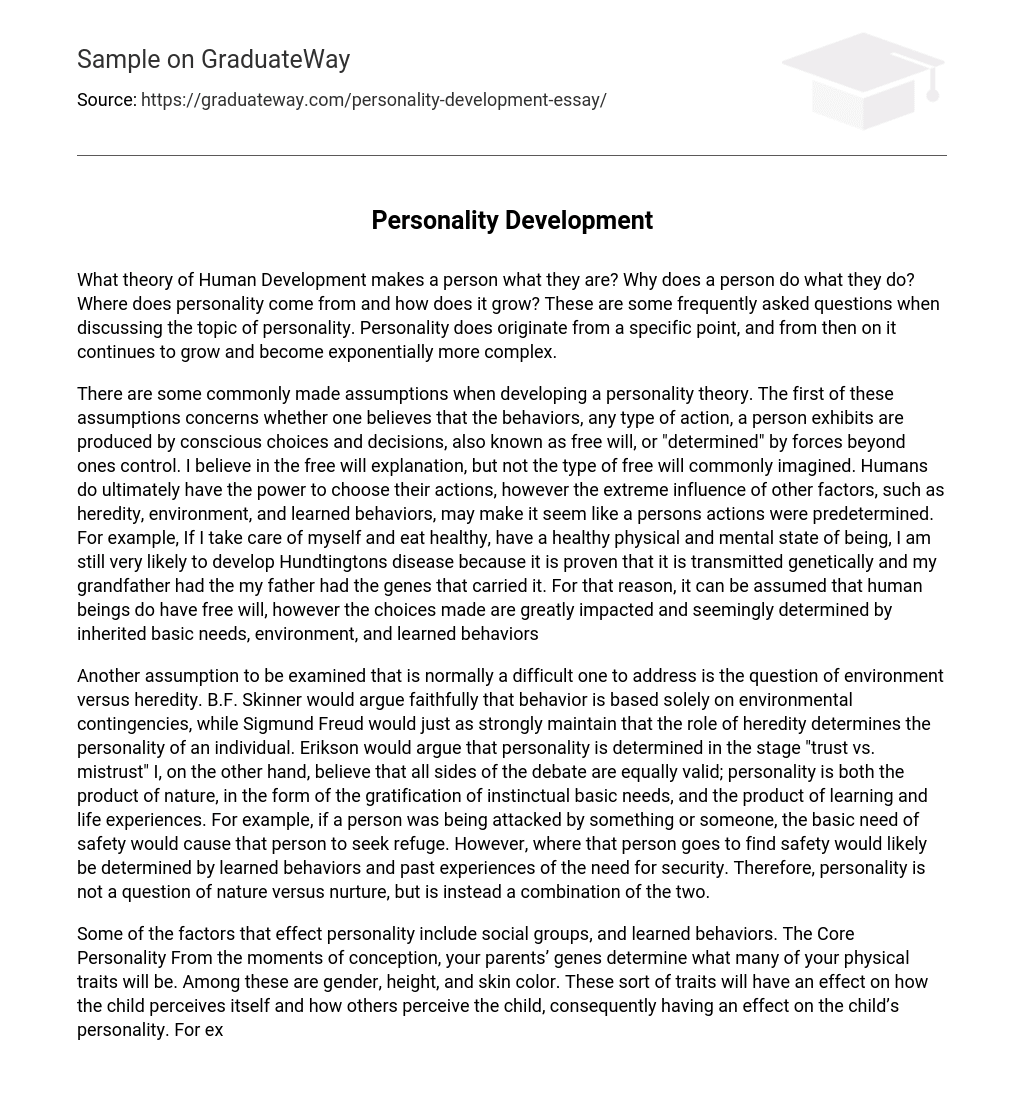When considering personality, it is typical to inquire about the theory of Human Development that shapes an individual’s identity and behavior. The origins of individuals’ personalities and the motivations behind their behaviors are frequently scrutinized. Personality does have a beginning, which subsequently experiences a gradual progression, ultimately becoming more intricate as time passes.
When developing a personality theory, there are commonly made assumptions. The first assumption pertains to whether one believes that a person’s behaviors, any action they take, are a result of conscious choices and decisions, also referred to as free will, or if they are “determined” by external forces beyond their control.
In my personal belief about free will, I hold a non-conventional perspective. Ultimately, humans have the ability to choose their actions; however, the overwhelming influence of various factors like heredity, environment, and learned behaviors may create the illusion that a person’s actions were predetermined.
For instance, even if I prioritize self-care, maintain a healthy lifestyle and mental well-being,I am still highly likely to develop Huntington’s disease due to its genetic transmission. Both my grandfather and father possessed the genes for it.
Consequently, it can be assumed that human beings do possess free will but the choices made are significantly impacted and seemingly determined by inherited basic needs, environment and acquired behaviors.
Examining the question of environment versus heredity, B.F. Skinner contends that behavior is solely determined by environmental contingencies, whereas Sigmund Freud asserts that personality is shaped by heredity. Erikson argues that personality arises from the stage “trust vs. mistrust.” In contrast, I believe all viewpoints in this debate are equally valid: personality results from both nature and learning experiences. For example, when someone faces an attack, their instinctual need for safety drives them to seek refuge. Nevertheless, their choice of where to find safety would likely be influenced by learned behaviors and past experiences. Consequently, personality does not hinge on nature versus nurture alone but rather a combination of both factors.Personality can be influenced by various factors, including social groups and learned behaviors. It begins to develop during conception when genes inherited from parents determine physical traits such as gender, height, and skin color. These physical characteristics play a role in shaping how the child perceives themselves and is perceived by others, thus impacting their personality. If someone possesses a physical attribute that is criticized or mocked by others, it can negatively affect their self-esteem and overall personality.
I do not think anyone would honestly claim that all babies are equally intelligent at birth. This notion is absurd. Just as people are born with physical differences, they also have varying mental abilities. Therefore, the only factor that could initially influence an individual’s intelligence before birth is the genetic inheritance from their parents. Along with these genes, basic needs are also passed on. These needs encompass physiological requirements such as food, water, safety, curiosity, and the need for relationships. The relationship between a mother and her child is where these needs are first encountered.
Various circumstances can impact the development of personality in later stages. During infancy, trauma can have diverse effects on the body and/or brain. This encompasses the mother’s consumption of drugs such as alcohol, tobacco, and crack or physical abuse towards her while pregnant. Each of these factors has the potential to induce mental or physical disabilities in the baby. It is apparent that these aspects would affect the child’s learning and physical abilities, thereby shaping their personality. Inherited from parents are both physical and mental traits as well as fundamental needs, which ultimately shape the core personality through these genetic factors.
As an individual grows and matures, every post-birth experience they encounter contributes to the development of their personality, resulting in increased complexity. The core personality provides the basis for this lifelong trait, which is further shaped by these experiences. Thus, incorporating new experiences into the core personality leads to personal growth. These experiences originate from both environmental factors and genetic inheritance.





